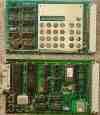 The very first Acorn microcomputer, based on the 6502 CPU with
1kbyte of memory.
When assembled, the upper board, with keyboard and LED display,
was mounted on top of the lower, CPU board.
The two boards have been separated here because the owner expanded
his machine into an Acorn System Three.
The very first Acorn microcomputer, based on the 6502 CPU with
1kbyte of memory.
When assembled, the upper board, with keyboard and LED display,
was mounted on top of the lower, CPU board.
The two boards have been separated here because the owner expanded
his machine into an Acorn System Three.
 The Atom was the first Acorn machine with a plastic moulded case.
It was still based on the 6502 CPU, but with more memory, a built-in
VDU (6847) and a full keyboard.
It ran Acorn BASIC, which differed significantly from the more common
Microsoft BASICs of the time.
Its most significant difference was the lack of PEEK and POKE commands,
which were replaced by a BCPL-like "byte indirection" syntax.
The Atom was the first Acorn machine with a plastic moulded case.
It was still based on the 6502 CPU, but with more memory, a built-in
VDU (6847) and a full keyboard.
It ran Acorn BASIC, which differed significantly from the more common
Microsoft BASICs of the time.
Its most significant difference was the lack of PEEK and POKE commands,
which were replaced by a BCPL-like "byte indirection" syntax.
 Acorn found success with the contract to supply the BBC Micro.
It was designed to be used in the BBC educational series
"The Computer Programme", but was also popular in schools, technical
colleges and universities.
The machine was also a very popular home computer, with games such
as Elite available.
Acorn found success with the contract to supply the BBC Micro.
It was designed to be used in the BBC educational series
"The Computer Programme", but was also popular in schools, technical
colleges and universities.
The machine was also a very popular home computer, with games such
as Elite available.
The BBC Micro spawned a whole industry in Britain supplying add-ons
like disk drives, printers, ROM expansion boards, educational
interfaces and, of course, software.
Companies that previously sold parts to electronics hobbyists, such
as Technomatic and Watford Electronics, became computer companies.
They built hardware for the BBC as well as writing the software
to drive it.
 The final stage of development of the BBC Micro was the Master series.
A cut-down version, the Master Compact, was available for home users
who didn't need the expansion ports.
The final stage of development of the BBC Micro was the Master series.
A cut-down version, the Master Compact, was available for home users
who didn't need the expansion ports.
 The Archimedes range was the beginning of the RISC era for Acorn.
The company had experimented with other CPU chips than the 6502 via the
BBC Micro's second processor facility.
Unable to find a really good off-the-shelf CPU, they designed their own.
The Acorn Risc Machine or ARM CPU is still in production.
The Archimedes range was the beginning of the RISC era for Acorn.
The company had experimented with other CPU chips than the 6502 via the
BBC Micro's second processor facility.
Unable to find a really good off-the-shelf CPU, they designed their own.
The Acorn Risc Machine or ARM CPU is still in production.
Return to John Honniball's Computer page
Return to John Honniball's home page
Copyright © 2007 by John Honniball. All rights reserved.